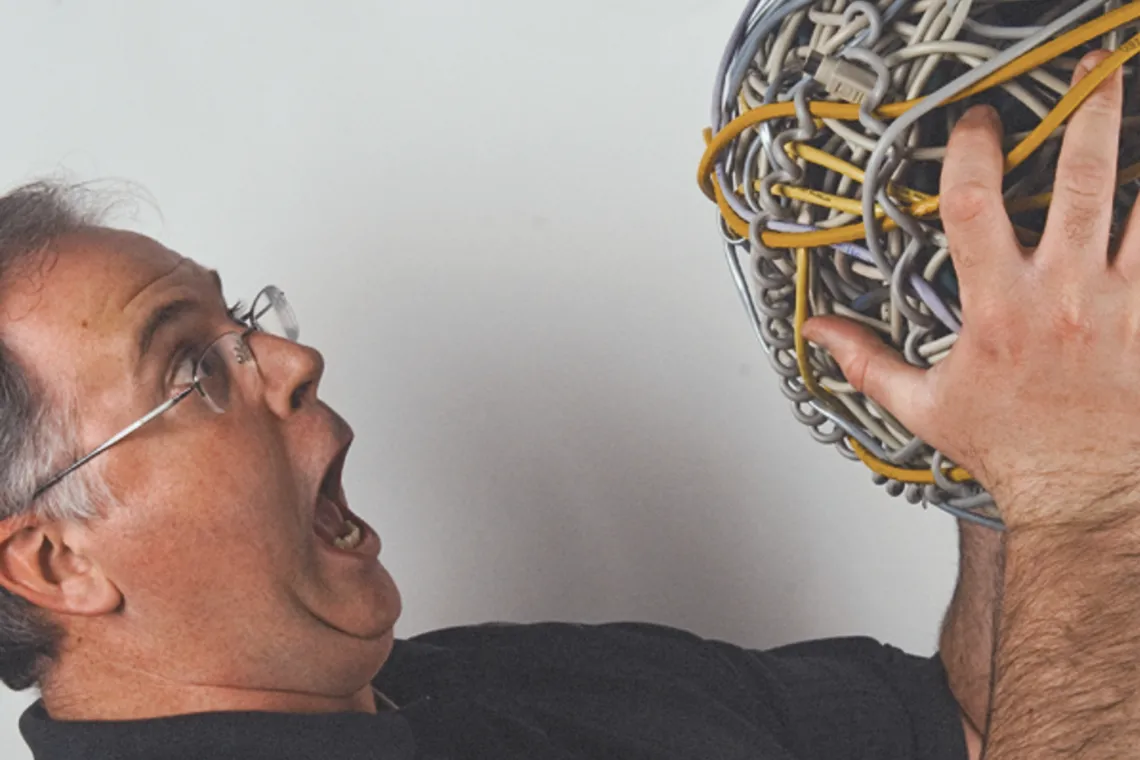Gary Windham Retires After Nearly Three Decades of Service
Principal architect of many IT firsts at UArizona is celebrated by his colleagues

Colleagues, friends, and family met on January 17 both on campus and online to celebrate the retirement of Gary Windham. The festivities marked the end of a fruitful and prolific 27 years of service as Principal Architect in University Information Technology Services. Amid the refreshments, a short ceremony of tributes, reflections, and speeches on Windham’s contributions were given by Barry Brummund, Chief Information Officer, former colleague Derek Masseth, now Executive Director of the Sun Corridor Network, and Darcy Van Patten, Chief Technology Officer.
Windham joined UITS in 1995, then known as the Center for Computing and Information Technology (CCIT), as a Senior Systems Programmer for the Unix Systems Team. Since then, he has been an integral part of the successful use of technology at the University of Arizona working on projects such as the implementation of DCE (the first shared credential environment for administrative systems), the development of DAT/DLT tape management software, and the creation of the first LDAP phonebook directory in CCIT.
Beginning in the early 2000’s Windham was a principal architect in a series of firsts for the University, starting with the development of the UA NetID, which was the first time a single credential could be used for authentication to both centrally managed and department-managed systems. In addition, he was responsible for developing the new central email system and web-based email client in 2003, and spearheaded the development of WebAuth, the first SSO system at the University.
During the transition from CCIT to UITS in 2007, Windham was promoted to Senior Enterprise Systems Architect, where he developed and implemented EDS and Shibboleth and began work on the Mosaic Project. The Mosaic Project was a comprehensive technology replacement project in which all of the aging administrative systems in Student, Financial, Payroll, Research, and Business, were to be replaced over a three-year period.
Over the course of the next fifteen years, Windham’s innovations on projects continued to be pivotal for the University. Some of those projects included the introduction of 2FA, the deployment of the CUI environment, provisioning for Adobe Creative Cloud accounts, deploying SAML authentication and app password functionality for the Office365 launch, and initiating the mandatory use of multi-factor authentication across all campus populations and services. He additionally built and deployed the “UA News” Amazon Alexa skill and “Alexa for Business” service.
“Gary was pivotal to just about every single innovation along that path and a steady force in all of these projects,” remarked Derek Masseth “We literally have tens of thousands of Wildcat lives that have been impacted by Gary's work and innovations and hundreds of institutions that have followed in his footsteps. And when you think about the impact of a 20-plus year career, it's measured in likely millions of lives.”
During the outset of the COVID-19 pandemic, Windham was involved with the University’s response efforts, such as the development of CovidWatch and STARS (SARS-CoV-2 Testing, Accessioning, and Results System). As STARS grew in scope, it absorbed the ability to upload vaccination status, check-in via self-service for testing, and enforce testing compliance. As a result of his work, Windham was the winner of the 2021 UA Individual Award for Excellence and a member of the COVID-19 Testing Team which won the 2021 UA Team Award for Excellence.
“When we got to COVID the University was disrupted in every single way,” said Barry Brummund. “As we got into how the University was going to deal with it strategically and quickly, Gary was assigned to take care of that. All those 400,000 student, alumni, employee, and community relationships that we manage flowed through Gary. That was to the benefit of the University and the entire community. There's little I could say—or that anyone here could say—other than thank you and fantastic job.”
Following his retirement, Windham will stay on contract with UITS to continue supporting the STARS team.
“I was just thinking about these punctuated moments in time—big things that happened—transformative things that happened,” mused Windham at the close of the gathering. “I’ve never seen myself as this tech guru. I’ve always had innovation at the forefront of my mind, and I try to find other great, excited, and smart people and work with them to make the case that we can push the envelope. I’m blessed that I had so many people who gave me the shoulders to stand on.”

